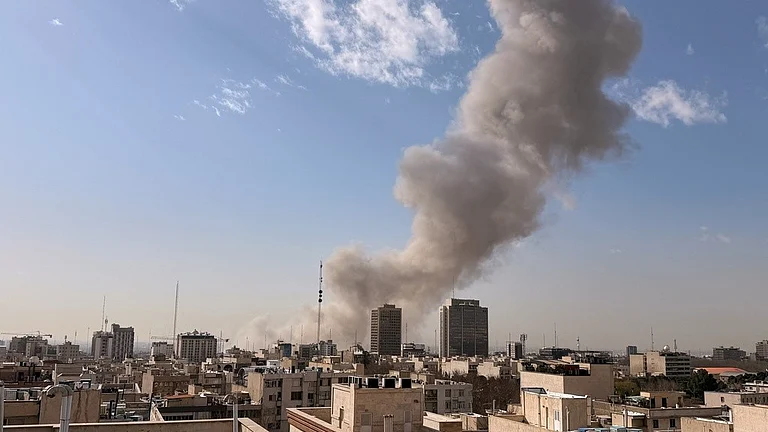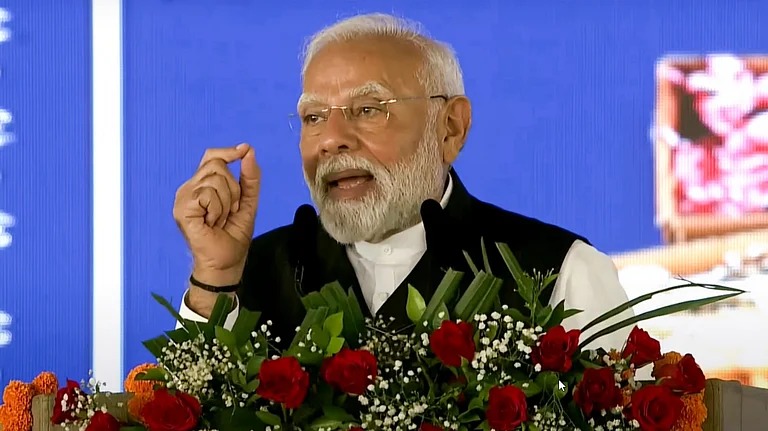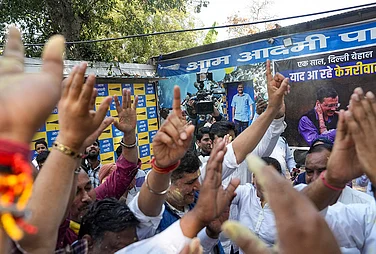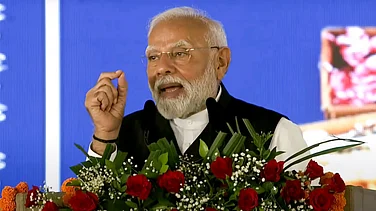Doing the Rounds
Residents of remote areas in Orissa’s Nayagarh district were surprised recently when they encountered a t-shirt-clad man who was cycling around and asking them how they were. Some recognised him as Arindam Dakua, their district collector. Dakua cycled 80 km to visit forested, hilly regions to interact with villagers to get authentic information about how government schemes were being implemented. Although he tried to remain incognito, people who did recognise him presented him with grievances and petitions regarding infrastructure, utilities, community problems and sanitation. Noting them down, Dakua promised action. “I love to mingle and interact with people as it helps me understand the ground situation better. I see it as an opportunity to reach out to the people at the grassroots, know their grievances,” he says.

To Still the Sands of Time
Cannabis is protecting the Mahakaleshwar Jyotirlinga in Ujjain from erosion, says a report by two experts from the Archaeological Survey of India. The report explains that the linga is being eroded by other offerings, including water, milk, flowers and ash. These have the effect of aiding the bacterial and fungal action triggered by high levels of humidity in the inner sanctum. This action generates acidic byproducts that “react with the metal ions of the sandstone in the jyotirlinga and very easily cause disintegration of the substrate through leaching of the cementing material.” But ‘bhang’, a cannabis-based paste offered to the linga, contains chemicals that combat biodegradation by preventing growth of bacteria and fungus. Pradeep Guru, a priest, says, “The ‘bhang’ used is of high quality. During the ‘shringaar’ ritual, about 1.5 kg of ‘bhang’ is used.”

Gomti Goes Green
Eco-unfriendly idols of Durga were given short shrift by people of Lucknow after this year’s Puja. Usually, river Gomti receives an extra burst of pollution around this time each year as thousands of idols are immersed in its waters, but this year only those deemed to be eco-friendly were immersed. The rest, consisting mainly of plaster-of-paris models, were buried in a large pit dug on the riverbank. Laudable as this effort may be, it is unfortunately not sufficient to save the river. Due to the sheer amount of industrial waste that it takes in as it flows over the plains of Uttar Pradesh, the Gomti at Lucknow already surpasses the Ganga at Varanasi in terms of pollution. Indeed, a CAG report last year found that the Gomti’s situation had only grown worse over the past few years, whereas the Ganga was looking somewhat better.
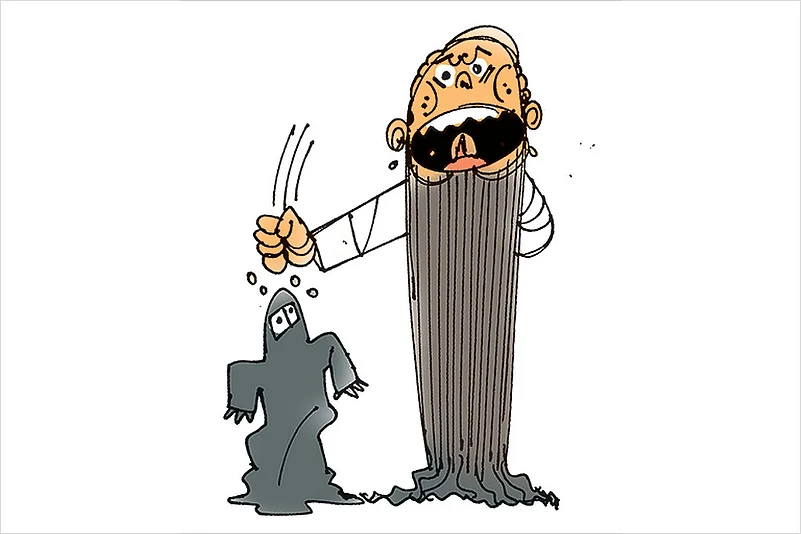
Fatwa Follows Current Trends
“Hair adds to the beauty of Muslim women and they should never get it cut,” pronounced Maulana L. Sadiq Qasmi, head of Darul Iftaa, as part of a fatwa issued on behalf of the famous Darul Uloom Deoband seminary. He went on to request that women avoid beauty parlours, as make-up might attract men. “The trend of Muslim women going to beauty parlours has increased.... It is not a good sign and it should be stopped immediately. We should have issued a fatwa in this regard long ago,” he said. The fatwa also bans women from plucking, trimming and shaping their eyebrows, deeming such activities to be ‘un-Islamic’. The fatwa was promulgated after a Saharanpur resident asked Darul Iftaa a question. “Do Islamic laws allow my wife to go for eyebrow plucking and hair-cutting,” he had inquired.

Beauty is in the Eye of the Storm
When organisers of the Miss Grand Myanmar beauty pageant chose to strip Shwe Eain Si of her crown, they explained that she was in breach of her contract. But the teenager alleges that it was provoked by her comments on the Rohingya crisis. In a video posted on social media, she highlighted the activities of the Rohingya militant group Arakan Rohingya Salvation Army (ARSA), which has been held responsible for the deaths of over 20 members of the security forces. Interspersing the video with shocking images, she accused ARSA of being “harbingers of terror and violence” who have led a “media campaign” to show that “they are being oppressed”.
Close of a momentous Century
One hundred years of history. Forty years as the hub of the Kannada film industry, it hosted the Priyadarshini preview theatre, where superstars would gather for advance viewings of their films. It was a former base for members of the CBFC too. This is the legacy of Bangalore’s George Oakes building, or Badami House, which its owners have started to demolish. The Karnataka Chalanachitra Academy and the Film Unit of the Department of Information and Public Relations will both have to vacate the building, as the government has lost a legal battle with the owners.
Honest Profits
On Gandhi Jayanti, near the bus shelter in Papanasam on the Thanjavur-Kumbakonam road in Tamil Nadu, a certain shop was open from 10 am to 6pm. Its stock included stationery items, confectionery and books about Gandhiji. Business that day was worth Rs 5,000. Why is this noteworthy? The shop’s sign features a picture of the Mahatma along with the English name, ‘honesty shop’, with aal illa kadai in Tamil, meaning ‘a shop without a shopkeeper’. That’s what. Open on October 2 each year, it has no shopkeeper, just a box into which the buyers can drop money. A ritual for the past 16 years now, the amount collected has always tallied with what is expected, with no complaints of theft.

A General’s GDP Index
Pakistan’s army chief, Gen. Qamar Javed Bajwa, does not believe in military coups that topple elected governments. But that does not stop him from offering free advice to civilian heads of government on how to run the country’s economy more efficiently. According to him, Pakistan needs to expand its tax base, bring in financial discipline and ensure continuity of economic policies to be able to break out of the begging bowl syndrome.
“The economy is showing mixed indicators. Growth has picked up but debts are sky high. Infrastructure and energy have improved considerably but the current account balance is not in our favour,” the army chief said while addressing a seminar, according to Dawn newspaper.
Bajwa pointed out, “Our tax to GDP ratio is abysmally low and this needs to change if we are to break the begging bowl.” The general said that the economy remains a major concern during National Security Council meetings, saying that he regularly reads the business and economy page of newspapers.
Sounding more like an economIST-turned-politician, Bajwa said, “Pakistan is capable of creating sufficient fiscal space to address underlying structural problems through tax reforms, documenting economy, diversifying the export base and encouraging savings to finance a level of investment that could sustain growth rate higher than the rise of population.” But benefits should also reach all parts, including interior Sindh, FATA, Balochistan and southern Punjab, he argued.
Gen Bajwa said that after the end of the Cold War people were claiming that economic interests alone would dictate national security but the “reappearance of age-old fault lines and reassertion of ancient parochial passions of race, language, religion and identity” has led to security once again becoming “the foremost business and task of the State”.
The army chief pointed out that the China-Pakistan Economic Corridor (CPEC) was “a complete development platform that has the potential to act as a powerful springboard for shared development in the entire Central Asia-South Asia region”.
Seeking close cooperation with both India and Afghanistan, Gen Bajwa said, “Our destinies are inextricably linked,” adding that he sincerely believes that the region “will sink or sail together”.
The statesman-like remarks of the army chief raises questions whether this is a new way of dictating the key policies without getting into governance directly.
Illustrations by Sajith Kumar







